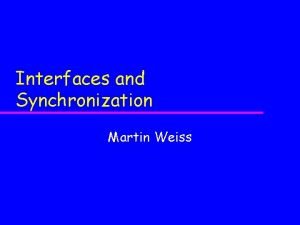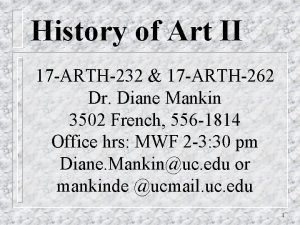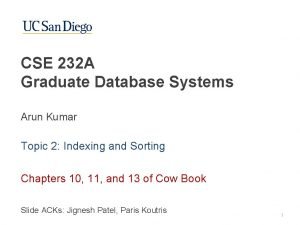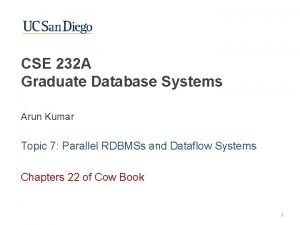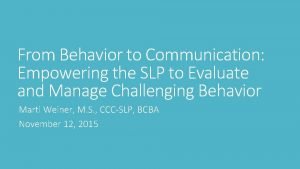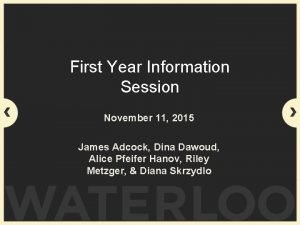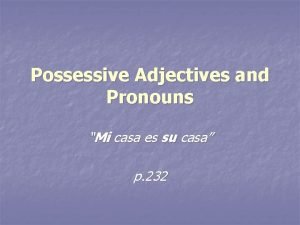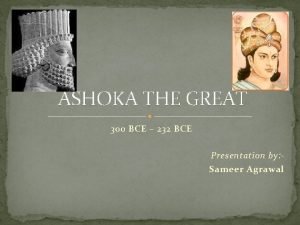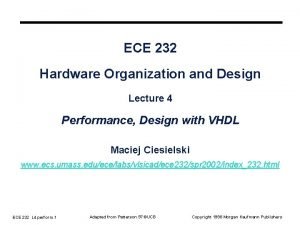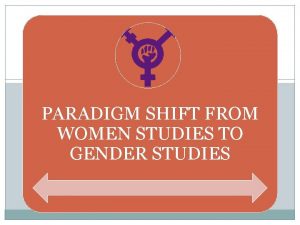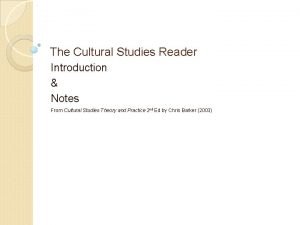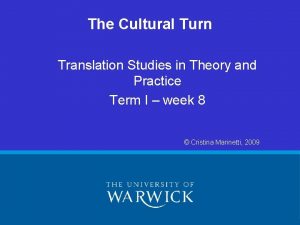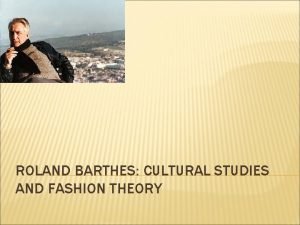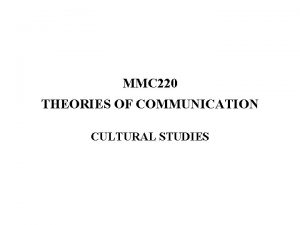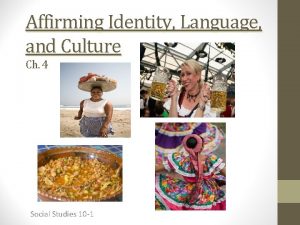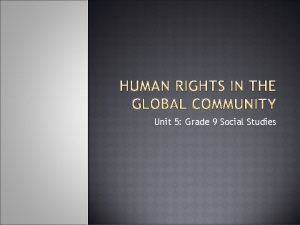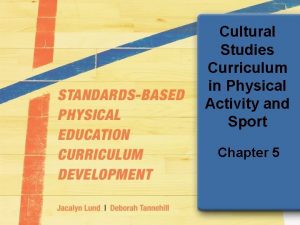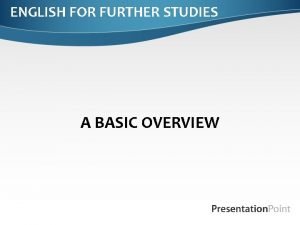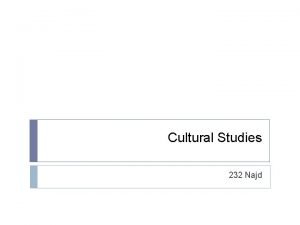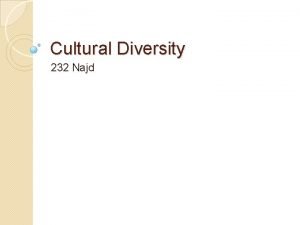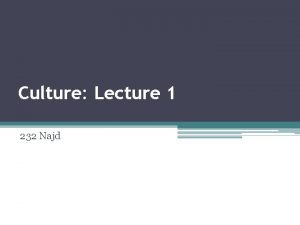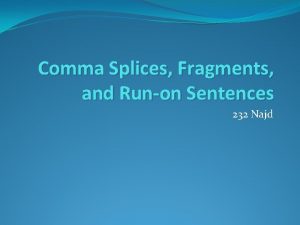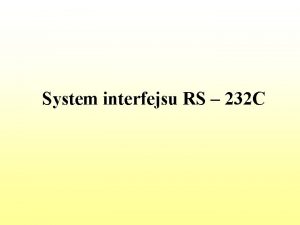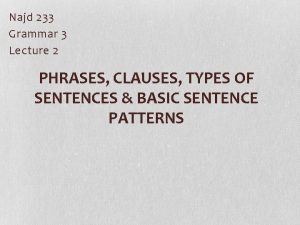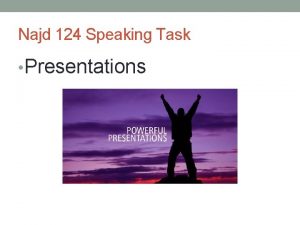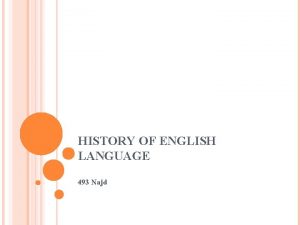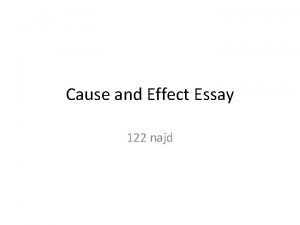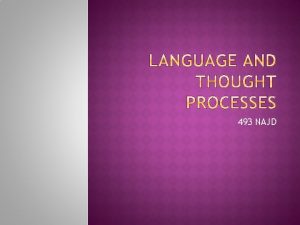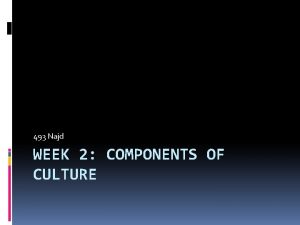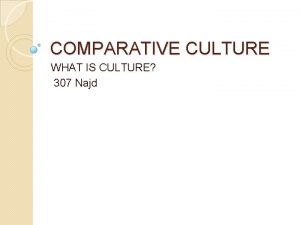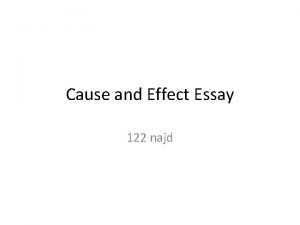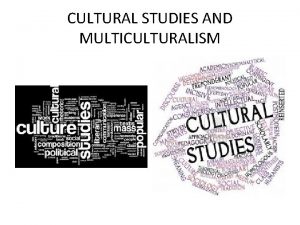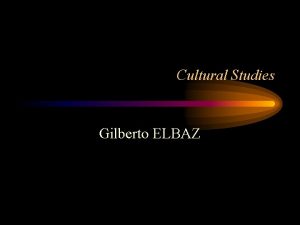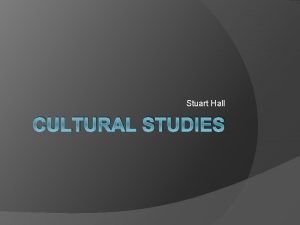Cultural Studies 232 Najd Cultural Studies Cultural Studies




































- Slides: 36

Cultural Studies 232 Najd

Cultural Studies �Cultural Studies is a field of research and teaching that investigates the ways in which "culture" creates and transforms individual experiences, everyday life, social relations and power. �It is not a unified movement with a fixed agenda but combination of different elements and movements.

Cultural Studies �Some Types of Cultural Studies �Postmodernism � �Popular Culture � �New Historicism � �Cultural Materialism �Postcolonialism � �

Premodernism � Epistemology: The primary epistemology of the premodern period was based upon revealed knowledge from authoritative sources. In pre-modern times, it was believed that the ultimate truth could be known and the way to this knowledge is through direct revelation. This direct revelation was generally assumed to come from God or a god. � Sources of Authority: The church, being the holders and interpreters of revealed knowledge, were the primary authority source in pre-modern times. � epistemology: a branch of philosophy that investigates the origin, nature, methods and limits of human knowledge

Modernism � Epistemology: Two new approaches to knowing became dominant in the modern times. The first was empiricism (knowing through the senses) which gradually evolved into scientific empiricism or modern science. The second epistemological approach of this period was reason or logic. � Sources of Authority: As the shift in power moved away from the church, politics (e. g. governments) and universities (scholars, professors) took over as the primary sources of authority. Often, a religious perspective was integrated into these modern authority sources, but the church no longer enjoyed the privileged power position.

Postmodernism: � Epistemology: Postmodernism brought with it a questioning of the previous approaches to knowing. Instead of relying on one approach to knowing, they advocate for an epistemological pluralism which utilizes multiple ways of knowing. This can include the pre-modern ways (revelation) and modern ways (science, and reason), along with many other ways of knowing such as intuition, relational, and spiritual. � Sources of Authority: Postmodern approaches seek to deconstruct previous authority sources and power. Because power is distrusted, they attempt to set up a less hierarchical approach in which authority sources are more diffused.

Postmodernism: � Postmodernism includes skeptical interpretations of culture, literature, art, philosophy, history, economics, architecture, fiction, and literary criticism.

Postmodernism: � Example: postmodernism in literature: � Postmodern authors tend to reject outright meaning in their novels, stories and poems, and instead highlight and celebrate the possibility of multiple meanings, or a complete lack of meaning, within a single literary work.

Postmodernism: � While Modernist literary writers often depicted the world as fragmented, troubled and on the edge of disaster - which is best displayed in the stories and novels of such Modernist authors as Ernest Hemingway, F. Scott Fitzgerald, Gertrude Stein, Albert Camus, Virginia Woolf, and Thomas Mann Postmodern authors tend to depict the world as having already undergone countless disasters and being beyond redemption or understanding.

Postmodernism: � At the core of many Postmodern literary writer's imaginations is a belief that the world has already fallen apart and that actual, singular meaning is impossible to locate (if it can be said to exist at all), and that literature, instead, should serve to reveal the world's absurdities, countless paradoxes and ironies.

Postmodernism: � Postmodern literary writers come from all across the world. Postmodern literature is not specific to writers from any particular region or culture. There are thousands of writers and literary works from all over the world which are considered 'postmodern' by critics and scholars. Among the most famous and critically respected works of postmodern literature include the following: � 1. Italo Calvino's Invisible Cities 2. Vladimir Nabokov's Pale Fire 3. Samuel Beckett's Waiting for Godot

Popular Culture

Popular Culture: �Definition: Popular culture is the accumulated store of cultural products such as music, art, literature, fashion, dance, film, television, and radio that are consumed primarily by non-elite groups such as the working, lower, and middle class.

Popular Culture: � There are two opposing sociological arguments in relation to popular culture. � One argument is that popular culture is used by the elites (who tend to control the mass media and popular culture outlets) to control those below them because it dulls people’s minds, making them passive and easy to control. �A second argument is just the opposite, that popular culture is a vehicle for rebellion against the culture of dominant groups.

Popular Culture: �Examples of popular culture come from a wide array of genres, including popular music, print, cyber culture, sports, entertainment, leisure, fads, advertising and television. �Sports and television are arguably two of the most widely consumed examples of popular culture, and they also represent two examples of popular culture with great staying power.

Popular Culture: �Sports are played and watched by members of all social classes, but the masses are responsible for the huge popularity of sports. �Some sporting events, such as the World Cup and the Olympics, are consumed by a world community. Sports are pervasive in most societies and represent a major part of many people’s lives.

Popular Culture: �Many people watch numerous hours of television every day. It is such a prevalent aspect of contemporary culture it is difficult to imagine life without it. �There are those who believe TV is responsible for the dumbing down of society; that children watch too much television; and that the couch potato syndrome has contributed to the epidemic of childhood obesity.

New Historicism and Cultural Materialism � Simple Definition of New Historicism: a method based on the parallel reading of literary and nonliterary texts, usually of the same time period. It refuses to privilege literary text. It is no longer a matter of literature maintaining the foreground and history the background, instead it is a matter of literature and history occupying the same area and given the same weight. Reading all of the textual traces of the past, fiction or non.

New Historicism: �New Historicism is a literary theory based on the idea that literature should be studied and intrepreted within the context of both the history of the author and the history of the critic.

New Historicism: �New Historicism acknowledges not only that a work of literature is influenced by its author's times and circumstances, but that the critic's response to that work is also influenced by his environment, beliefs, and prejudices.

New Historicism: �For example, when studying Shakespeare's Merchant of Venice, one always comes to the question of whether the play shows Shakespeare to be anti-Semitic. �The New Historicist recognizes that this isn't a simple yes-or-no answer that can be teased out by studying the text.

New Historicism: �This work must be judged in the context in which it was written; in turn, cultural history can be revealed by studying the work. �Studying the history reveals more about the text; studying the text reveals more about the history.

New Historicism: �The New Historicist also acknowledges that his examination of literature is "tainted" by his own culture and environment. The very fact that we ask whether Shakespeare was anti-Semitic — a question that wouldn't have been considered important a century ago — reveals how our study of Shakespeare is affected by our civilization.

Cultural Materialism: � It is a theory that states that material things influence change: environment, resources, technology, and other material things are the major influences on cultural change. � This theory is based on the simple belief that human social life comes as a response to the practical problems existing in the earth and that practical, material and economical factors can explain some or all cultural phenomena.

Cultural Materialism: �Materialism is at odds with idealism. �Idealists believe in the transcendent ability of ideas while materialist believe that culture cannot transcend its material trappings.

Post-colonialism: �Post-colonialism is an intellectual direction (sometimes also called an “era” or the “postcolonial theory”) that exists since around the middle of the 20 th century. It developed from and mainly refers to the time after colonialism.

Post-colonialism: �The post-colonial direction was created as colonial countries became independent. Nowadays, aspects of post-colonialism can be found not only in sciences concerning history, literature and politics, but also in approach to culture and identity of both the countries that were colonized and the former colonial powers. �However, post-colonialism can take the colonial time as well as the time after colonialism into consideration.

Post-colonialism: �Postcolonial literature is a body of literary writing that responds to the intellectual discourse of European colonization in Asia, Africa, Middle East, the Pacific and elsewhere. Postcolonial literature addresses the problems and consequences of the decolonization of a country and of a nation, especially the political and cultural independence of formerly subjugated colonial people.

Post-colonialism: �Post-colonialism in literature includes the study of theory and literature as it relates to the colonizer-colonized experience. Edward Said is the leading theorist in this field, with Chinua Achebe being one its the leading authors.

Post-colonialism: � Edward Said �Said's book 'Orientalism' (1978) is considered the foundational work on which post-colonial theory developed. Said, then, could be considered the 'father' of post-colonialism. �His work, including 'Orientalism', focused on exploring and questioning the artificial boundaries, or the stereotypical boundaries, that have been drawn between the East and West, specifically as they relate to the Middle East.

Post-colonialism: �In doing this, Said focused specifically on our stereotypes of Middle-Easterners; however, these same ideas can be extended to include how we view all 'others. ' �This is the 'us'-'other' mentality that many colonizers take with them into a new country. Such simple generalizations lead to misconceptions and miscommunications, which are often the basis of post-colonial analysis.

Post-colonialism: � Things Fall Apart is a novel written by Nigerian author Chinua Achebe in 1958. � The novel shows the life of Okonkwo, a leader and local wrestling champion in Umuofia, one of a fictional group of nine villages in Nigeria, which is inhabited by the Igbo people (in the novel, "Ibo"). It describes his family and personal history, the customs and society of the Igbo, and the influence of British colonialism and Christian missionaries on the Igbo community during the late nineteenth century.

Post-colonialism: � Post-colonial Theory � � What it is: � � the study of interactions between European nations and the societies they colonized; � an examination of the impact of the European conquest, colonisation and domination of non. European lands, peoples, and cultures; � an analysis of the inherent ideas of European superiority over non-European peoples and cultures;

Post-colonialism: � From the point of view of colonised peoples, Western traditions of thought and literature have dominated world culture, marginalising or even excluding non. Western traditions and forms of cultural life and expression. � � Key concepts in post-colonial theory therefore include: � � Representation � Identity � History

Post-colonialism: � Edward Said (1935 -2003) � �A Palestinian literary critic best known for his work Orientalism pub. 1978. Said use the term Orient to refer to North African Arab and Middle Eastern peoples and cultures who are represented as the binary opposite of Western or occidental cultures. � For Said representations of the orient serve to reimpose colonial domination by suggesting that oriental culture is inferior/negative in relation to Western culture. This can be summarised as follows: �

Post-colonialism: � Western culture � Has its own history on it � Rational, normal irrational � Morally superior, virtuous � Western Oriental culture Has history imposed Strange, bizarre, Lazy, weak, immoral Culture: Masculine features of activity and domination � Oriental culture: Feminine features of possessiveness and submission
 C a b c d e f g
C a b c d e f g Eia-232-d
Eia-232-d 156+232
156+232 Cse 232
Cse 232 Before the edict of milan christian art
Before the edict of milan christian art Bp blg. 232
Bp blg. 232 Cse 232
Cse 232 Conector rs-232
Conector rs-232 Cse232
Cse232 Ucsd cse 232
Ucsd cse 232 Usd 232
Usd 232 273-232
273-232 Bus 232 floridsdorf fahrplan
Bus 232 floridsdorf fahrplan Batas pambansa bilang 232 education act of 1982
Batas pambansa bilang 232 education act of 1982 Actsc 445
Actsc 445 Cse 232
Cse 232 The possessive adjectives modify nouns
The possessive adjectives modify nouns Yüzlüğe yuvarlama hesap makinesi
Yüzlüğe yuvarlama hesap makinesi Ashoka 232
Ashoka 232 Amdahl's law
Amdahl's law Paradigm shift from women studies to gender studies
Paradigm shift from women studies to gender studies Introduction to cultural studies summary
Introduction to cultural studies summary Cultural turn in translation studies
Cultural turn in translation studies Roland barthes cultural studies
Roland barthes cultural studies Birninghan
Birninghan Affirmation of identity social studies definition
Affirmation of identity social studies definition Key concepts in cultural studies
Key concepts in cultural studies History grade 9 unit 5
History grade 9 unit 5 Physical cultural studies
Physical cultural studies What is e commerce in business studies
What is e commerce in business studies English for further studies
English for further studies Ocr cambridge nationals sports studies resources
Ocr cambridge nationals sports studies resources Iron panel interpretation
Iron panel interpretation Minecraft media studies
Minecraft media studies Uw oshkosh environmental studies
Uw oshkosh environmental studies Organ donation case studies
Organ donation case studies Media and creative studies
Media and creative studies

